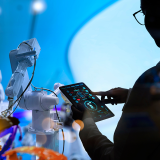
Prevedere e gestire l’impatto dei cambiamenti
Prevedere e gestire l’impatto dei cambiamenti è una delle sei attività principali del programma di lavoro di Eurofound per il periodo 2021-2024. Eurofound fornirà dati riguardanti gli sviluppi strutturali che incidono sull’economia e sui mercati del lavoro dell’Unione europea (UE), trainati in larga misura dalla trasformazione digitale e dalla transizione verso un’economia neutra in termini di emissioni di carbonio , ma anche dalla crisi causata dalla COVID-19. La ricerca si prefigge l’obiettivo di aiutare i decisori politici a prevedere e a preparare i mercati del lavoro e i luoghi di lavoro europei a tali cambiamenti.
A partire dal 2021 Eurofound fornirà indicazioni sull’impatto di queste megatendenze sulle condizioni di vita e di lavoro nell’UE. Per quanto riguarda la trasformazione digitale, la ricerca ne indagherà gli effetti sull’occupazione e sulle condizioni di lavoro, nonché sul mercato del lavoro. Gli aspetti da considerare includeranno il dialogo sociale e il suo ruolo nel plasmare il cambiamento strutturale, i quadri normativi, la previdenza sociale e l’intelligenza artificiale (IA). Basandosi su ricerche precedenti in materia di lavoro su piattaforma digitale, il periodo 2021-2024 rappresenterà un’opportunità per concentrarsi sulla mappatura e sulla fornitura di una valutazione dell’efficacia delle iniziative politiche nell’affrontare le sfide rappresentate dal lavoro su piattaforma digitale.
Eurofound si proporrà inoltre di sostenere la transizione dell’UE verso un’economia neutra in termini di emissioni di carbonio, tra cui l’economia circolare e l’attuazione dello strumento per la ripresa dell’UE denominato NextGenerationEU, attraverso l’analisi degli effetti socioeconomici. Rientrano tra questi gli spostamenti occupazionali e la trasformazione del lavoro e delle condizioni di lavoro, nonché l’effetto distributivo delle politiche in materia di cambiamenti climatici. Parte di questo lavoro si baserà sui risultati di un progetto pilota sul futuro dell’industria manifatturiera [future of manufacturing (FOME)] realizzato da Eurofound.
Per continuare questo lavoro nel periodo 2021-2024, Eurofound collaborerà con varie organizzazioni internazionali e agenzie dell’UE, ad esempio con l’Agenzia europea dell’ambiente (AEA) nel settore delle ripercussioni sociali delle politiche in materia di cambiamenti climatici. Sarà inoltre consolidata la cooperazione con altri attori della ricerca nel settore della trasformazione digitale – il Centro comune di ricerca (JRC), l’Agenzia dell’Unione europea per i diritti fondamentali (FRA) e l’Agenzia europea per la sicurezza e la salute sul lavoro (EU-OSHA). È prevista anche la collaborazione con l’Organizzazione internazionale del lavoro (ILO) per quanto riguarda il cambiamento del mondo del lavoro.



































